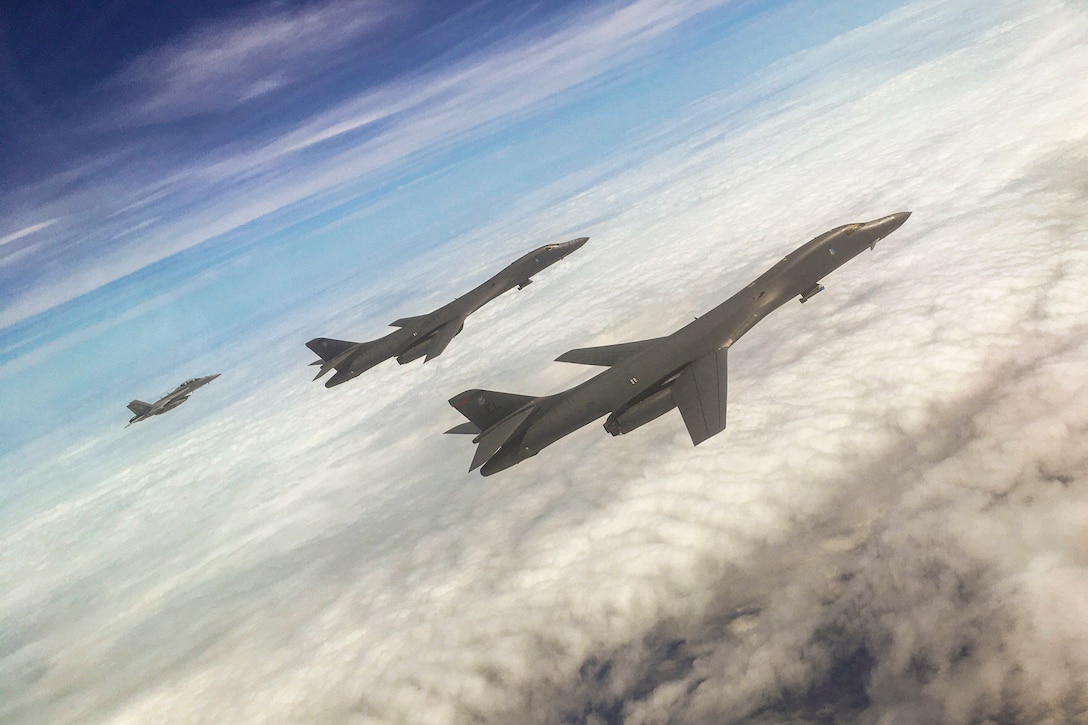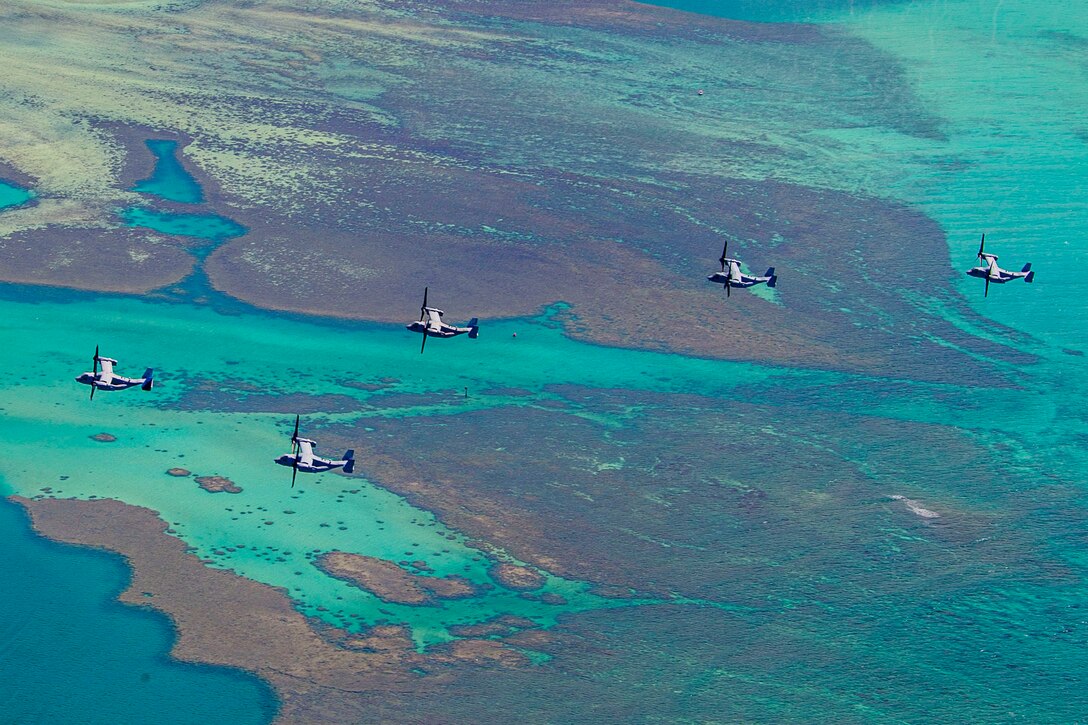A U.S. Navy F/A-18E Super Hornet intercepts two U.S. Strategic Command B-1B Lancers as they enter the Canadian Air Defense Identification Zone, and again as they enter the Continental U.S. North American Aerospace Defense Command Region, May 29, 2020. The intercepts were part of a U.S. Northern Command-led, large-scale homeland defense exercise.
Monday, June 01, 2020
Honor Guard Soldiers Continue Performing Final Salutes During COVID-19
On a warm and cloudy morning, Army Sgt. Nikole Clark and Army Spc. Austin Dycha stepped out of their cars at Holy Cross Cemetery in Lackawanna, New York, to conduct a funeral ceremony in honor of former Army Air Force Cpl. Raymond Kegler, who served during World War II.
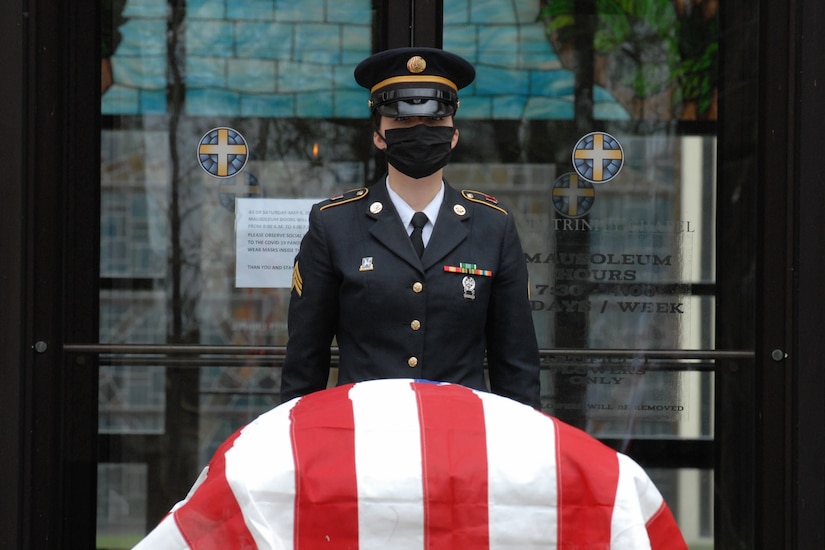
Despite the impact of the COVID-19 pandemic, the New York Army National Guard's Military Funeral Honors Program continues to provide final salutes to Army veterans.
The two-member honor guard team surveyed the cemetery's granite-walled mausoleum and began final preparations for Kegler’s May 14 funeral.
They donned jackets and service caps, brushed off lint, and pulled on their white gloves.
Then they added the newest part of their uniforms: a black cloth mask. These masks are the primary protection against the spread of COVID-19 and are now required during funeral honors.
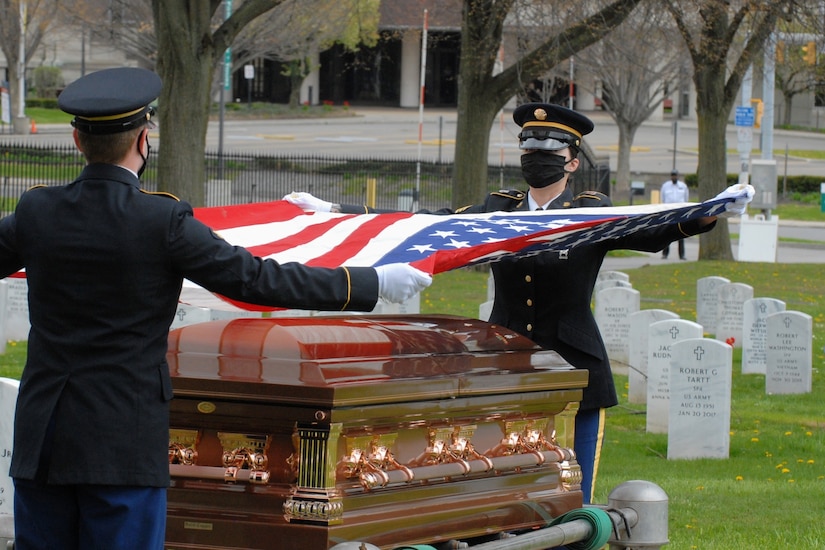
Before the pandemic, the New York Army National Guard's Military Funeral Honors Program was performing an average of 850 services per month, statewide. Now, the average is down to 350..
"Although veterans are passing, some cemeteries are not allowing honors to be performed at the moment," explained Army 1st Lt. Melisa Rosario, the officer in charge of the program.
Two types of ceremonies would normally be available. The first is modified full honors for retirees with 20 or more years of service, or those who died while on active duty. The second is modified honors for Army veterans with an honorable discharge. Nine soldiers, including a firing party, perform the modified full honors, and only two soldiers perform the modified honors.
Based on National Guard Bureau guidelines, a maximum of three soldiers are currently allowed at a funeral, so New York's program is offering only modified honors. Where they are permitted, each individual ceremony is directed by a detail leader like Clark, who has the duty of presenting the burial flag to the veteran's family.
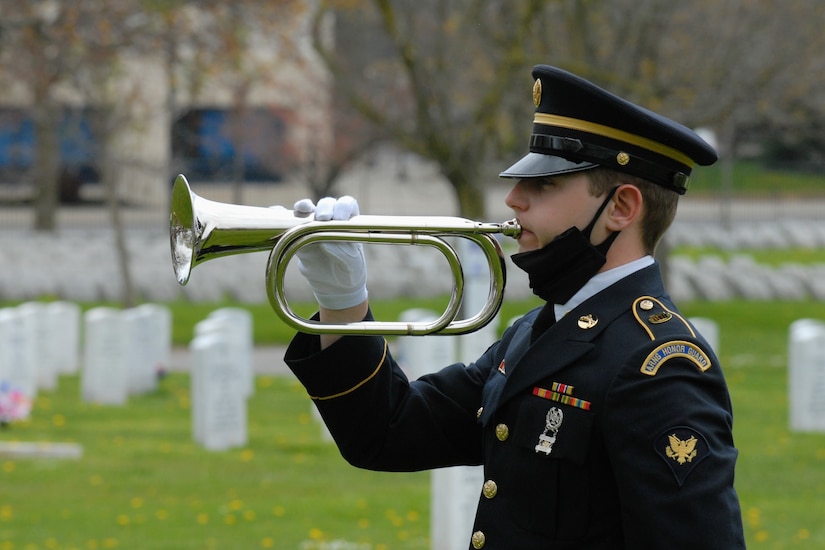
"The detail leader will determine how safe they feel at the service and has the option to place the flag 6 feet from the next of kin, or on the casket," Rosario said.
New COVID-19 protection guidelines are causing a lot of uncertainty in the way the time-honored traditions of the final salute are performed. Small details such as which way a funeral procession arrives at the cemetery are normally the same each time, but with gate restrictions and casket arrival times affecting when and how the service takes place, honor guard members have to adjust quickly to each situation.
"We're trained to manage it and think on our feet," Clark said. "We make it work, whatever we've got to do."
The personnel restrictions don't just affect the honor guard. They also affect the number of family members allowed to attend.
"We've done services where it's hundreds of people there, and now it's a handful of people," Clark explained. "And once in a while you get them live-streaming, too. It's not really something you saw before."
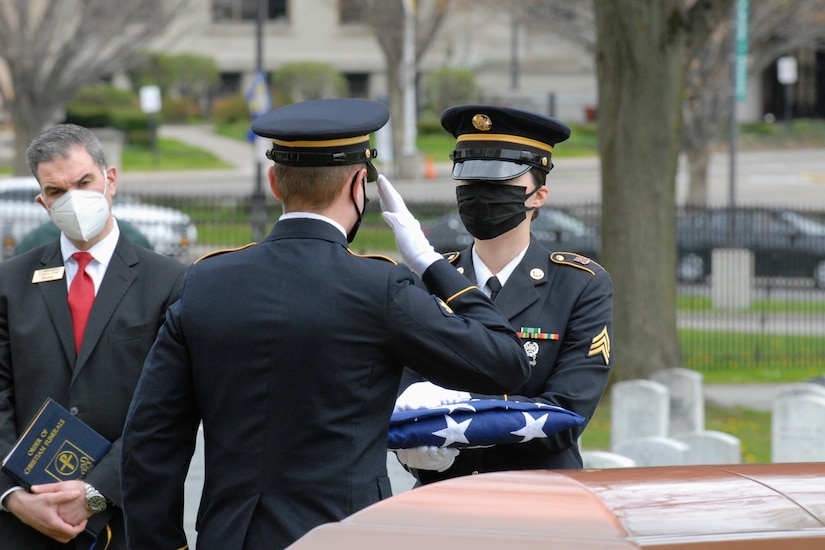
Clark has performed more than 700 funeral honors. The steps become near-muscle memory, she said. What took the most getting used to was not kneeling in front of the next of kin to present the burial flag, she said.
"Kneeling in front of someone and looking into their eyes, and presenting them a flag is kind of a worth-a-thousand-words kind of thing, a big gesture, a more powerful gesture," Clark explained.
Clark and Dycha say that what they offer families during funerals while the COVID-19 pandemic continues is a sense of normalcy in a far-from-normal time.
"It's definitely less intimate," Clark said. "You just have to make do with it and still know that the family understands."
(Army Capt. Avery Schneider is assigned to the New York National Guard.)
New Jersey Air National Guard Helps Veterans Home Staff, Residents
When the call for volunteers was sent out, 31 airmen with the New Jersey Air National Guard's 177th Fighter Wing stepped up to help the state's most vulnerable population at the New Jersey Veterans Memorial Home at Vineland.
Armed with cleaning supplies and a desire to help others, the airmen have integrated themselves with the staff at the facility.
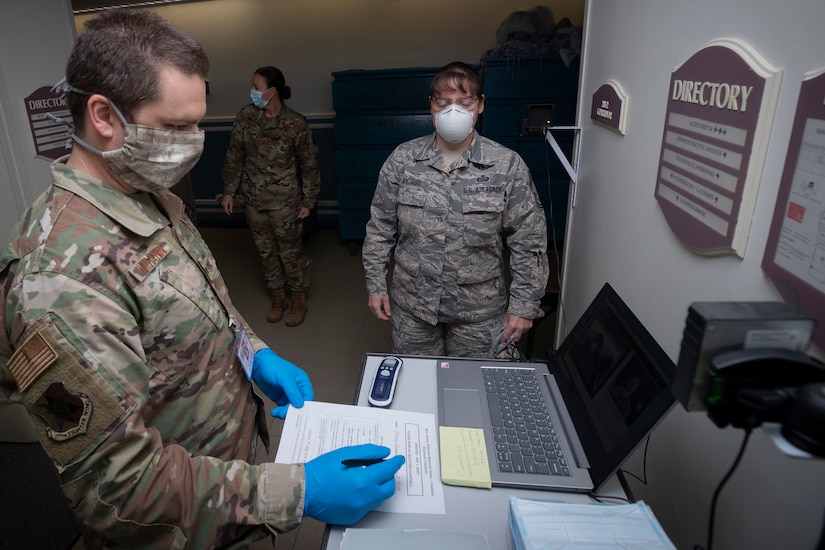
"Having the National Guard here has been really helpful," said Allyson Bailey, the chief executive officer of the Vineland Home. "They're supplementing our mission here, which is taking care of our residents. Some of the duties the guard has assumed have been instrumental in helping us to reduce the spread of the virus in the home."
Bailey noted that the housekeeping mission has been especially important.
"For our housekeepers, who have been working seven days a week with no days off, having that extra support has been pivotal," she said. "The guard is also helping us out with life enrichment. Residents and families have not been able to directly interact for more than a month and a half now, so virtual visits, emails and phone calls are very important to the residents' families. It has been a tremendously positive thing to have them here helping us."
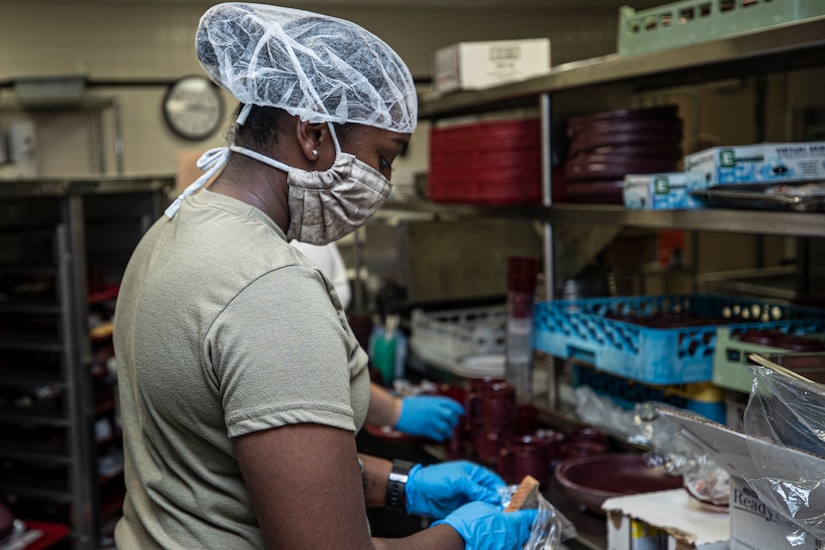
"We're supplementing where the facility really needs help," said Air Force 1st Lt. Bernard Cortes, the officer in charge of Team Vineland. "Housekeeping, food service, health screening checkpoints, facility engineering and life enrichment are some of the missions we're doing here. Airmen are getting food orders for residents, talking with them and keeping them in touch with their families. We're giving them that interaction that is a basic human need."
Cortes said that the guardsmen have developed a great relationship with Vineland's staff.
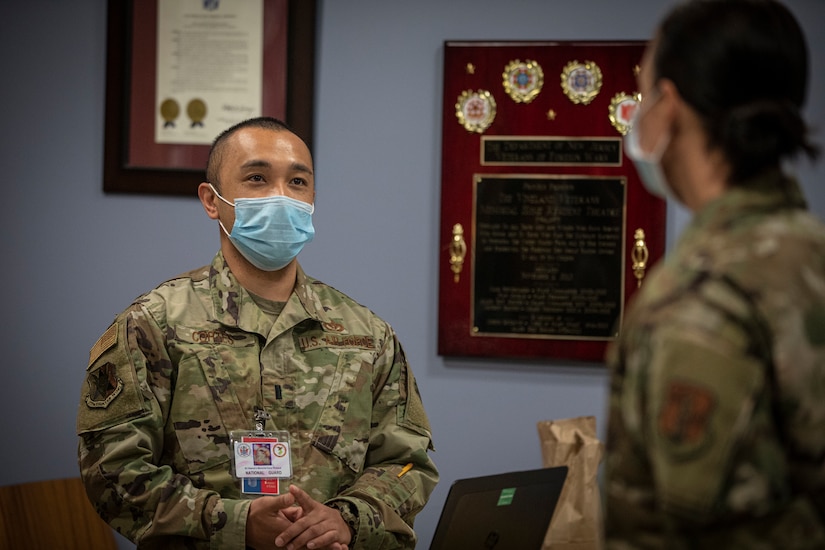
"It means a lot for me to be a part of this," Cortes said. "I'm from New Jersey, I grew up here. I look at the veterans, and I want to give them the best care that I can. To see the residents smile and salute us, it makes it feel worthwhile."
"It's very rewarding," said Air Force Senior Airman Connor Jarvis, who is working on the housekeeping team. "It's nice to be able to help. I'm mopping floors, I'm sanitizing countertops, cleaning bathrooms and common areas eight hours straight."
Air Force Senior Airman Casey Keevill said that working with residents in life enrichment has been a meaningful experience and has made an impact on the lives of the guardsmen as well as the veterans.
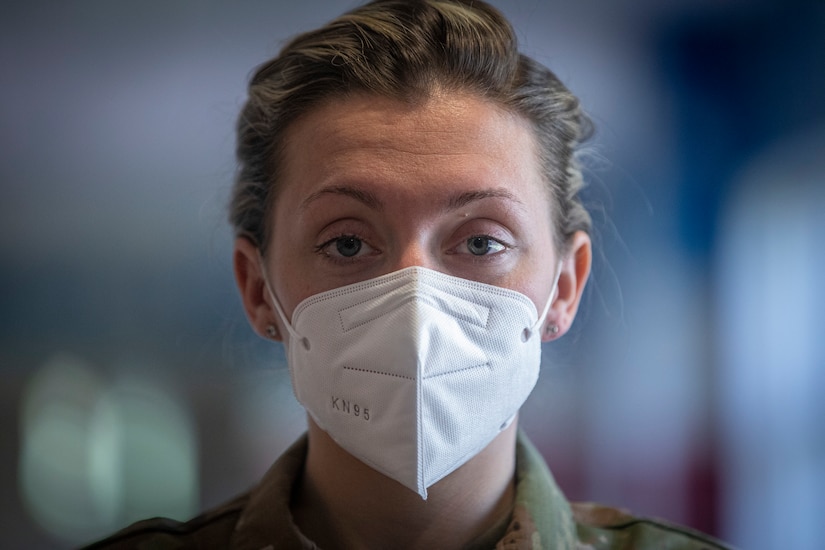
"I work directly with the residents," Keevill said. "Our job is to keep residents involved and active. We start the morning by delivering newspapers and engage with them to see how they're doing and what they need. It's been great because you really get to know these people.
"It's been amazing seeing what the National Guard can do when our state needs us," Keevill continued. "You get a whole new perspective. Seeing it and being a part of it gives it so much more meaning."
DOD Supports Partner Nations With COVID-19 Mitigation Assistance
The Defense Department's Cooperative Threat Reduction Program has supported COVID-19 requests for assistance from 13 nations totaling about $2.9 million, said Deputy Assistant Secretary of Defense for Countering Weapons of Mass Destruction David Lasseter, whose office provides strategic guidance for the program to ensure mission alignment with broader National Defense Strategy objectives.

This recent support is part of the department's ongoing efforts to counter biological weapons of mass destruction threats. The DOD CTR Program works cooperatively with international partners to mitigate WMD-related threats to the U.S. homeland, U.S. forces abroad, and U.S. partners and allies. This includes biological, nuclear, and chemical weapons and related delivery systems.
With regard to biological threats, the program has partnered with more than 30 countries since 2004 to improve their ability to detect, diagnose and report the spread of especially dangerous pathogens. It has accomplished this through training, information exchanges, scientific partnerships, providing equipment, and laboratory construction. It works across sectors to help partner scientists and technicians safeguard pathogen samples held in laboratory facilities against accidental or intentional release, promote research collaboration, and facilitate trainings and best practices.
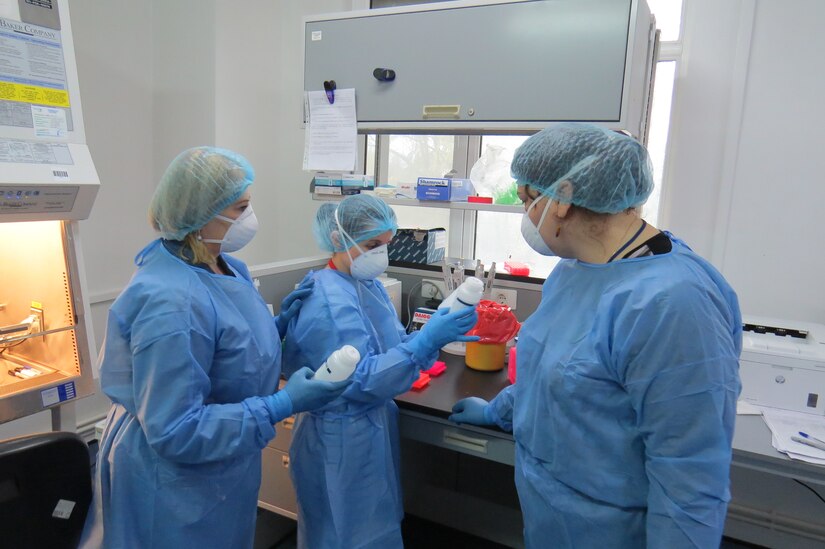
Partner nations are now leveraging these capabilities developed over the last 15-plus years as part of their COVID-19 preparedness and response efforts. Laboratory facilities that CTR previously helped partner nations construct or renovate are playing a particularly crucial role, Lasseter said. These facilities, fully owned and operated by the partner nation, are often the central facility in a country or region running diagnostic tests and research for COVID-19. For example:
- Georgia's National Center for Disease Control and Public Health in Tbilisi is running COVID-19 diagnostic tests and sharing COVID-19 research and procedures with other partners in the region;
- Ukraine's Public Health Center’s Emergency Operation Center is sharing outbreak data and practices for safe and effective COVID-19 diagnosis and reporting; and
- Armenia's Health Ministry, through its network of biological analysis laboratories, is conducting analyses of COVID-19 samples.
The DOD CTR Program also is supporting foreign partner requests for assistance to help stem the spread of COVID-19. These vary from requests for information and subject matter expertise to requests for diagnostics support and personal protective equipment. For example, between March 19 and April 7, Azerbaijan's Ministry of Health requested 400 protective goggles and masks, 51 infrared thermometers, 200 disposable coveralls, and 2.4 tons of disinfectant, all of which the DOD CTR Program provided by April 10.
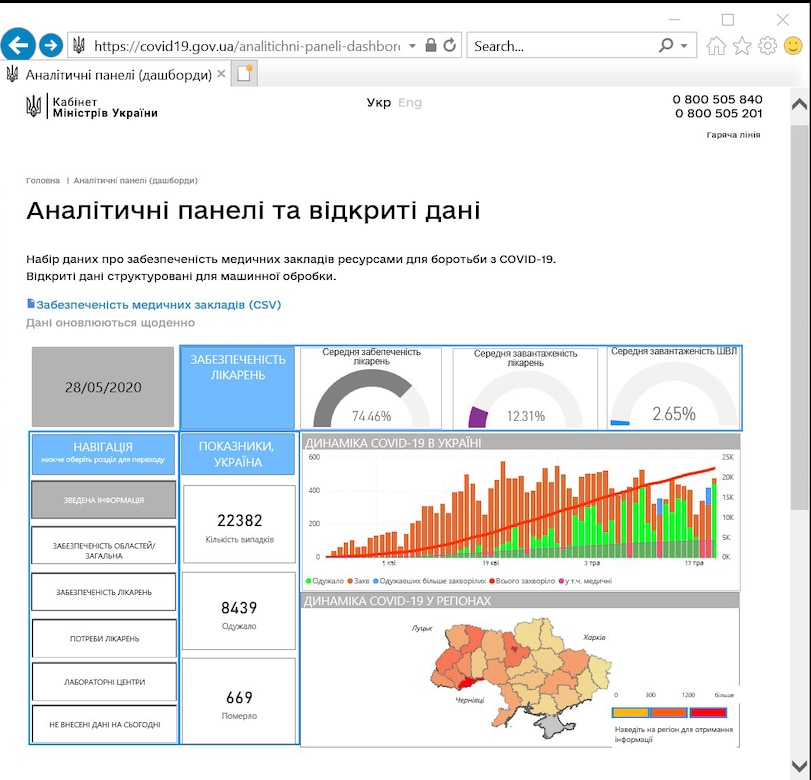
More generally, he explained, a unique aspect of the program involves helping a partner nation's military and civilian components improve cross-ministerial communication and capability to address biological threats that are of concern to both the host nation and the U.S.
A long-standing principle of the DOD CTR Program is extending that spirit of cooperation across geographic borders, supporting regional biosurveillance networks to enable a coordinated and timely response to disease outbreaks. These efforts have helped stem the spread of COVID-19.
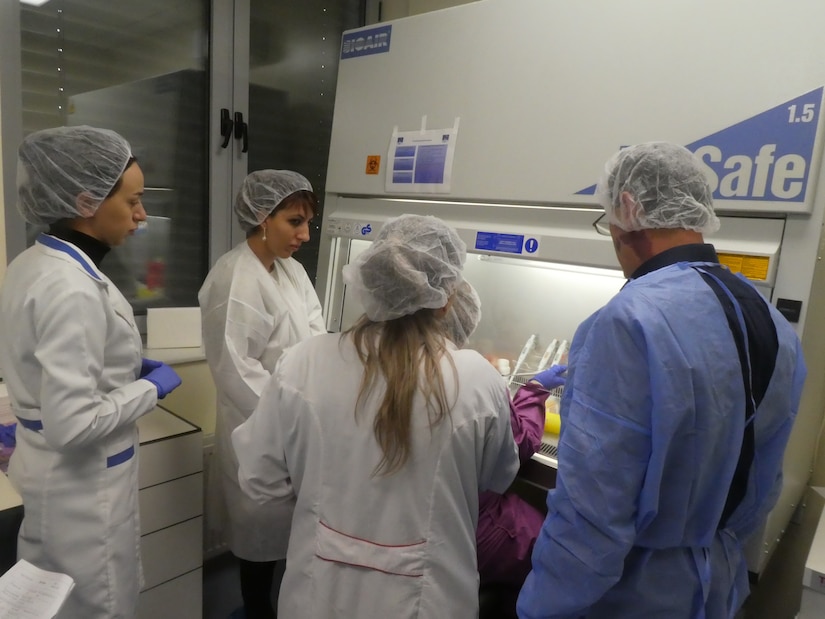
For example, the Biosurveillance Network of the Silk Road, a regional network of health science experts from a range of countries, including Armenia, Azerbaijan, Bulgaria, Georgia and Ukraine, coordinates with DOD CTR subject matter experts on best practices for safe and effective disease diagnosis and reporting.
''Given the work we have done with these countries, BNSR members have shared with one another COVID-19 outbreak data, diagnosis and reporting,'' said Dr. Robert Pope, director of the Cooperative Threat Reduction Program at the Defense Threat Reduction Agency.
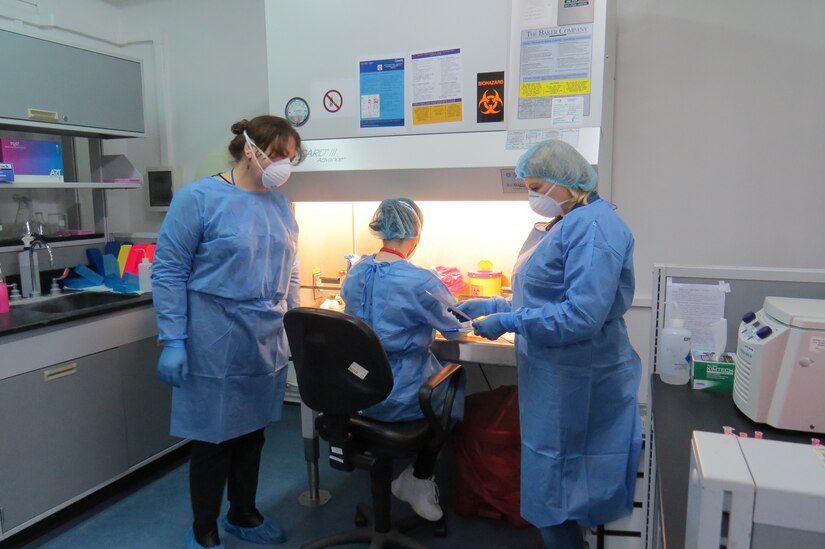
The DOD CTR Program also is helping partner nations implement the Electronic Integrated Disease Support System, which facilitates the collection and analysis of infectious disease information across medical, veterinary and environmental health communities. ''Several countries are now using EIDSS to quickly report COVID-19 cases,'' Pope noted.
''DOD remains firmly committed to working with partners and allies to
achieve U.S. WMD threat reduction goals, even in light of COVID-19,''
Lasseter said. ''Threats around the world have not paused, and neither
will we.''
Pakistan Delivers COVID-19 Response Supplies as Gesture of Partnership
A Pakistan air force C-130 transport aircraft landed at Joint Base Andrews, Maryland, with 100,000 protective masks and 25,000 coveralls donated to the Federal Emergency Management Agency for COVID-19 response efforts.

Ambassador Asad Majeed Khan and other Pakistan Embassy officials greeted the air crew after landing.
Khan highlighted the historic ties between the two nations and their armed forces, noting that both countries have fought together against terrorism and now stand together in the fight against the COVID-19 pandemic.
Acting Assistant Secretary of Defense for Indo-Pacific Security Affairs David F. Helvey represented the Defense Department. He expressed DOD's thanks to Pakistan, underscoring that the donation of personal protective equipment was a display of generosity and goodwill from a long-standing partner. Helvey emphasized that DOD is proud to stand with Pakistan's military in the global fight against COVID-19.
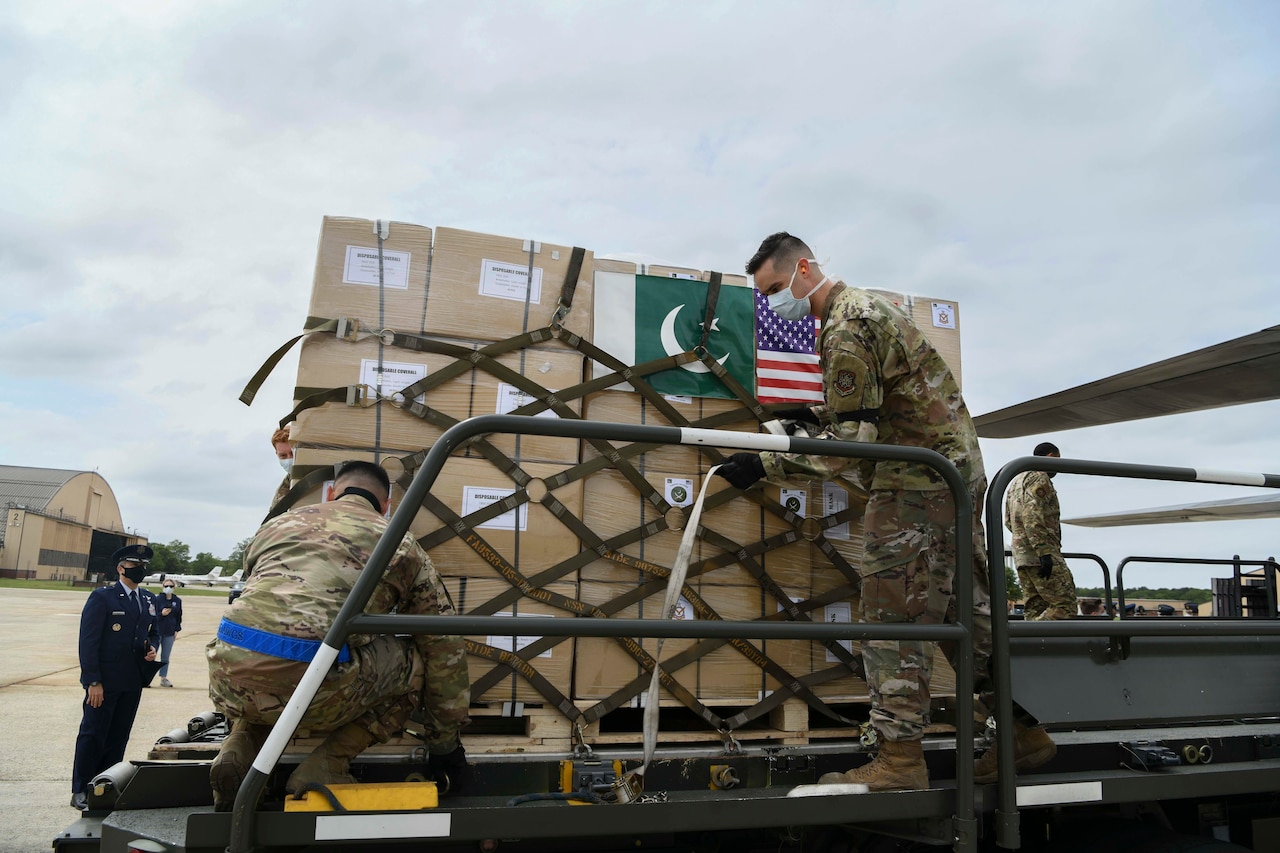
Air Force Brig. Gen. Matthew C. Isler, the director of regional affairs for the deputy undersecretary of the Air Force for international affairs, thanked the Pakistani representatives for their support.
"We are grateful to Pakistan's military for its generosity and partnership," the general said. "Partners stand together as we move through challenges in these unprecedented times."
The materials were offloaded by airmen assigned to the 89th Airlift Wing.
New 'EFMP & Me' Web Tool Launched to Help Families With Special Needs
The Department of Defense Office of Special Needs and Military OneSource launched today a new digital tool to guide military families with special needs to the specific information and resources they need. The tool, called EFMP & Me, conveniently connects families anytime and anywhere with tools and information about the Exceptional Family Member Program, or EFMP. Using the tool, families can learn about support services, preparing for a move or deployment, responding to changes in education or medical needs, and adjusting to new life situations.
“The Department of Defense is committed to supporting our families with special needs, and EFMP & Me is an important enhancement to the Exceptional Family Member Program,” said Kim Joiner, deputy assistant secretary of defense for Military Community and Family Policy. “EFMP & Me provides virtual access to EFMP support services for all stages of their military lives, whether they’re just starting out in the program, navigating medical or educational systems, or preparing for retirement from the service.”
Available on computers or mobile devices, EFMP & Me gives families personalized assistance based on their specific circumstances. On the homepage, users answer a few questions then select the types of information they want, such as medical, education, EFMP enrollment, PCS, child care, accessibility or housing. The tool then creates customizable checklists, at the DOD policy level, for users to follow. These checklists include important to-dos, tips and resources that help fine-tune the individual’s experience. Users with a Military OneSource account can save their checklists to view again later.
EFMP & Me is one part of a broad system of support for military families with special needs. That support starts with EFMP Family Support on installations and includes the Military OneSource network, which provides 24/7 support to service members and families anywhere in the world. Click here to access the EFMP & Me tool. Contact Military OneSource EFMP Resources, Options and Consultations for free, around-the-clock support, tools, assistance and more. Call 800-342-9647 or live chat with a consultant. OCONUS/International? Click here for calling options.
The Office of the Deputy Assistant Secretary of Defense for Military Community and Family Policy is responsible for oversight of quality-of-life policies and programs that support the wellness and mission-readiness of Service members, their families, and survivors.
